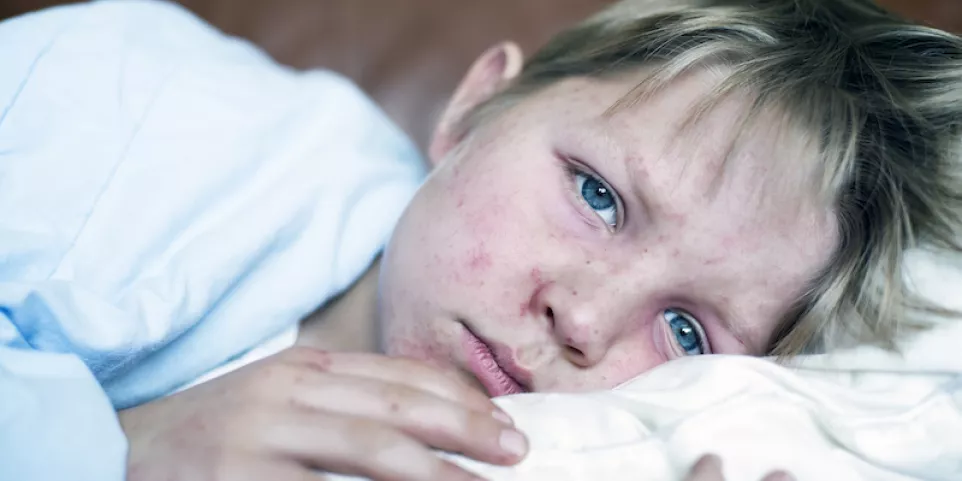Measles: Here’s what you need to know


The Texas Department of State Health Services is reporting the first death from measles in the ongoing outbreak in the South Plains and Panhandle regions. The school-aged child who was not vaccinated was hospitalized in Lubbock and tested positive for measles.
As of Feb. 25, 124 cases of measles have been confirmed in the outbreak since late January. Most of the cases are in children. Eighteen people have been hospitalized over the course of the outbreak.
Measles is a highly contagious respiratory illness, which can cause life-threatening illness to anyone who is not protected against the virus. During a measles outbreak, about one in five people who get sick will need hospital care and one in 20 will develop pneumonia.
Measles can be transmitted by direct contact with infectious droplets or by airborne spread when an infected person breathes, coughs, or sneezes. People who are infected will begin to have symptoms within a week or two after being exposed.
Early symptoms include high fever, cough, runny nose, and red, watery eyes. A few days later, the telltale rash breaks out as flat, red spots on the face and then spreads down the neck and trunk to the rest of the body. It can also cause pregnancy complications, such as premature birth and babies with low birth weight, so individuals suspected of having measles infection should avoid anyone pregnant or possibly pregnant.
Since it’s a viral infection, measles won’t respond to antibiotics. Increased fluid intake and acetaminophen (for fever) are recommended to decrease the severity of the symptoms. For most, these common symptoms will disappear without treatment within two to three weeks.
Complications from measles include diarrhea, ear infections, pneumonia, encephalitis and in severe cases even death.
A person is contagious about four days before the rash appears to four days after. People who could have measles should stay home during that period.
Before widespread use of the vaccine, measles led to more than 2 million deaths per year.
Between 1985 and 1992, death from measles was reported in approximately 2 out of every 1,000 measles cases in the U.S. In 2000, measles was declared eliminated in the U.S. or no longer constantly present, though spot outbreaks have occurred. Declining rates of vaccination have allowed outbreaks to occur in recent years.
Experts also attribute the resurgence of measles in the U.S. in part to lower vaccination rates in certain communities, making unvaccinated people vulnerable to the disease and lowering the level of herd immunity that protects large groups from being infected.
The majority of measles cases occurs in unvaccinated individuals or those with unknown vaccination status – 89% of cases in 2024 and 95% so far in 2025.
Thankfully, it’s easily preventable. You have the power to protect your children (and yourself) from this disease by getting vaccinated.
The best way to prevent measles is to get vaccinated with the measles-mumps-rubella (MMR) vaccine. This vaccine has been in use for nearly 50 years and is very safe and effective. The Centers for Disease Control and Prevention vaccination guidelines are:
For parents:
People who think they have measles or may have been exposed to measles should isolate themselves and call their health care provider before arriving to be tested. It is important to let the provider know that the patient may have a suspected measles infection or close exposure to a measles infected contact, and to get instructions on how to come to the office for diagnosis without exposing other people to the virus.
If your child was exposed to measles and has not been immunized against it, your pediatrician can administer the MMR vaccine within 72 hours of exposure or in some cases immune globulin (IG) to try to prevent the disease or make the illness less severe.
Should you have additional questions regarding your child’s immunization status, don’t hesitate to contact your pediatrician.
For medical providers:
Suspected measles cases should be roomed immediately upon arrival at the clinic.
Providers and staff should wear appropriate PPE when assessing a suspected measles infected patient.
Infection control measures and diagnostic protocols should be reviewed and followed. Suspected cases should be reported to the local health department as well.
To find your nearest Texas Children’s Pediatrics location, click here. For MyChart, click here.
Texas announces first death in measles outbreak | Texas DSHS
Protecting Your Baby From a Measles Outbreak: FAQs - HealthyChildren.org